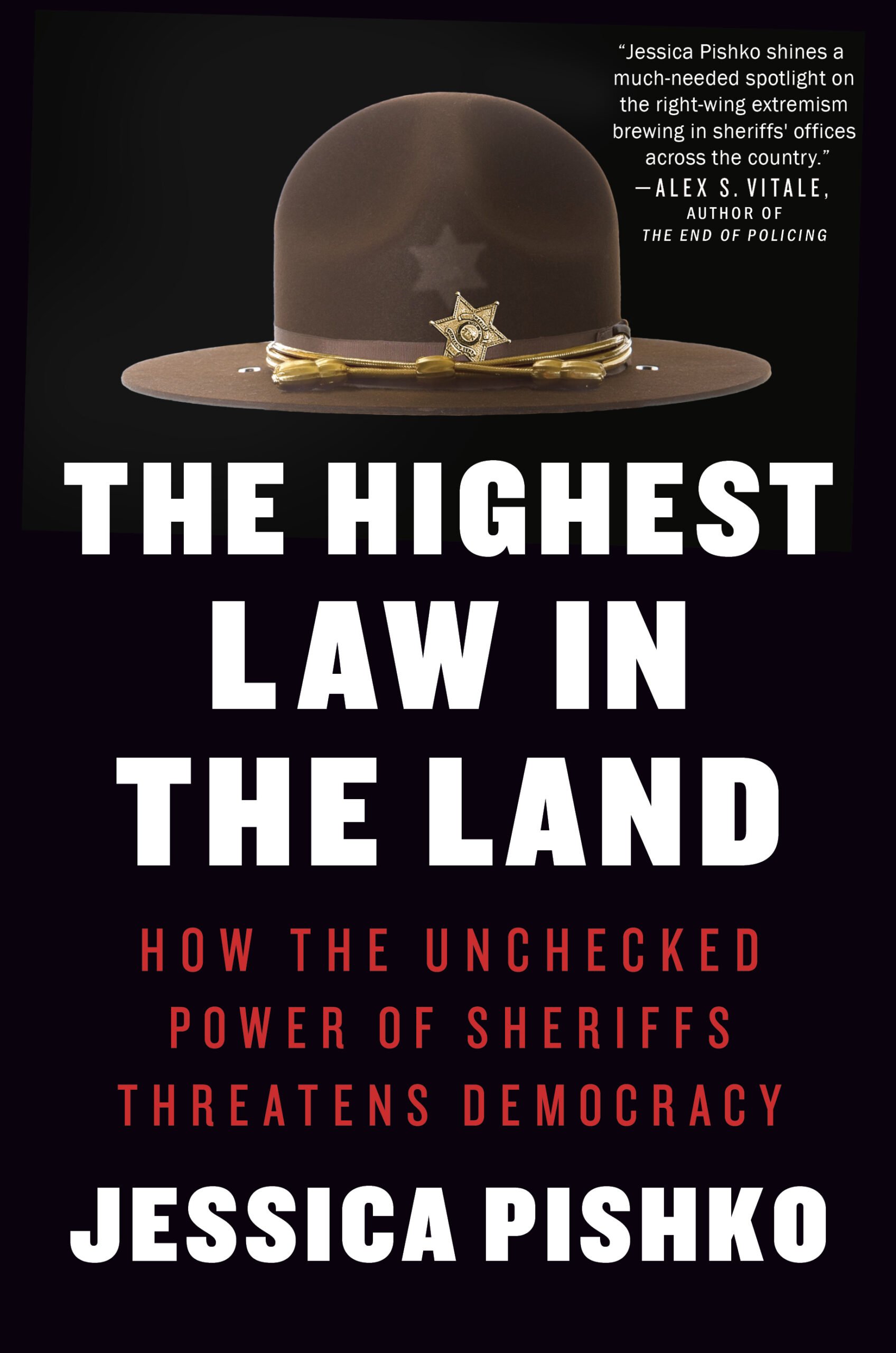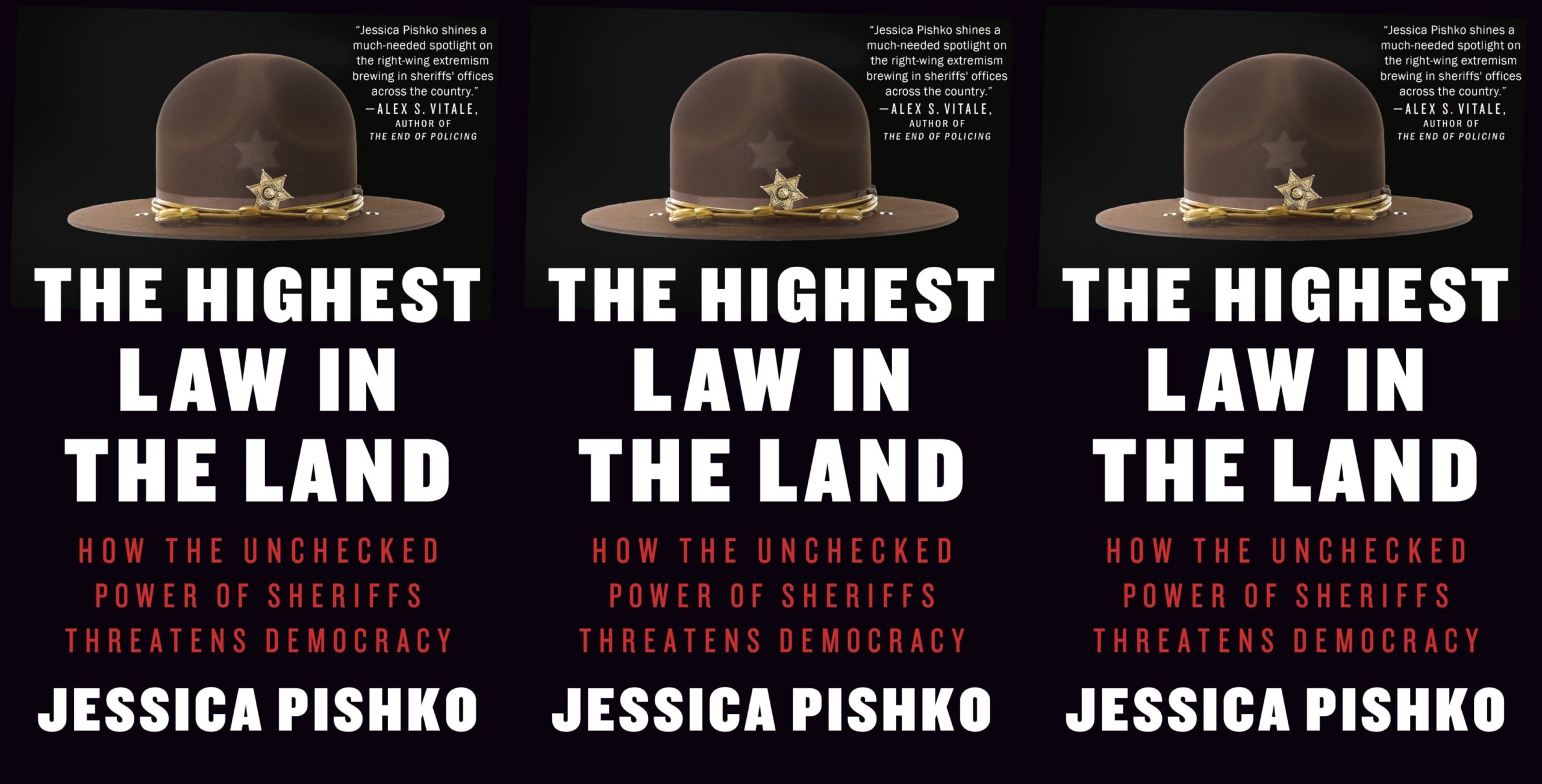Mark Lamb decided to run for sheriff of Pinal County, Arizona, after his pest control business failed and a police officer friend gave him a ride-along. “I had this deep burning desire to run for sheriff. I knew it was the Lord speaking to me and telling me I had a path,” Lamb said, as recorded in The Highest Law in the Land: How the Unchecked Power of Sheriffs Threatens Democracy, a new book from investigative journalist and attorney Jessica Pishko.
Surprisingly, many states don’t require candidates for sheriff to know anything about law enforcement or to have any particular training for a job that allows them to make arrests, oversee arsenals, and run jails. Though some dismiss America’s right-wing sheriffs as rogues (or nuts) with limited impact, extremists like Lamb locally and collectively wield increasing amounts of influence and power that threaten our country, writes Pishko.
In her 500-page volume, out September 17, Pishko details how a group of mostly white male sheriffs, like Lamb, have created a far-right conservative movement that promotes sheriffs as chosen by God to carry out the power of posse comitatus—meaning the power to assemble armed militias of their fellow citizens through a process known as “hew and cry” for just about any mission they may choose, including tackling supposedly widespread voter fraud, a border invasion, or a kiddie porn ring, among other popular conspiracy theories.
Instead of riding around on a horse to summon posses like old-school Western sheriffs, modern ultraconservative sheriffs like Lamb use streaming and social media to collect followers. Lamb runs Arizona’s third-largest sheriff’s department, with a $50 million budget, though it’s hard to see how he has time to do so: He simultaneously has starred in a series of reality TV shows and podcasts, peddled firearms, and founded a conservative sheriffs’ organization called Protect America Now. He’s one of many sheriffs Pishko describes in her book, the result of a multiyear nationwide investigation.
Sheriffs considered themselves “tamers of the frontier and enforcers of the ethnic divide.”
Though one sheriff’s authority doesn’t really extend much beyond the boundaries of their individual county, Pishko describes today’s American sheriff as an increasingly powerful elected figure who runs the nation’s massive infrastructure of local jails and is nearly always a well-funded incumbent with access to increasingly sophisticated weapons and little or no real political opposition. Nationwide, current and former ultraconservative lawmen like Lamb, who wears a white 10-gallon hat and often carries semi-automatic weapons, have quietly built alliances and collaborated via social media, obscure associations, and invitation-only gatherings.
Pishko’s book deftly probes the curious history of America’s sheriffs and examines their expanding political role, particularly in suburban and rural strongholds where the federal government can be viewed as the enemy.
As she describes it, some of this movement’s leaders, including Lamb’s mentor Richard Mack, ex-sheriff of Arizona’s Graham County, believe sheriffs possess unchecked constitutional powers that they can use to deputize constituents, make arrests, or conduct seemingly endless investigations. Indeed, at least one New Mexico sheriff she describes deputized the entire congregation of a local church in order for them to obtain the legal right to continue to meet for church services for “law enforcement” purposes during the COVID-19 pandemic and lockdowns, bypassing any mask or meeting restrictions.
During his presidency, Donald Trump appeared to buy into the idea of sheriffs’ unchecked constitutional powers. He actively invited more sheriffs to the White House than any of his predecessors, Pishko writes. True the Vote, a nonprofit that has repeatedly challenged voter registration practices and pushed for voter purges in Texas and other states, is also actively courting sheriffs as allies.
Though Mack and other members of the Constitutional Sheriffs and Peace Officers Association (CSPOA), the group he founded in Arizona, have perhaps gotten the most attention, Pishko describes extremist sheriffs in many states including Virginia, Michigan, Louisiana, Oregon, and of course, Texas.
Mack, raised a conservative Mormon in Utah, served two terms starting in the late ’80s as a rural county sheriff in Arizona. In 1994, he gained national fame by suing the federal government over the Brady Handgun Violence Prevention Act. In 2011, he founded CSPOA, while simultaneously serving as an early board member of the Oath Keepers, another far-right group. That same year, Mack moved to the Hill Country town of Fredericksburg, and he’s networked and held meetings in Texas for years. On a multistate CSPOA tour from 2020 to 2021, dozens of Texas law enforcement officials earned credit through the Texas Commission on Law Enforcement for trainings organized by Mack’s group, according to Pishko. Rand Henderson, sheriff of Montgomery County in the Houston suburbs, hosted one event. Gary Heavin, the wealthy founder of the Curves gym chain, flew Mack around on a private plane, Pishko writes.
Pishko digs deep in her efforts to explain the mythology behind the current conservative movement: the beliefs of adherents like Mack, she argues, are rooted in a mixture of rejected Church of the Latter Day Saints scriptures and a distortion of English history that glorifies the sheriff as a hero while ignoring that many sheriffs, including the fictional villain of Nottingham in the tales of Robin Hood, were mostly tax collectors.
Pishko argues that, historically, U.S. sheriffs considered themselves “tamers of the frontier and enforcers of the ethnic divide” and carried out the role of “mercenary-for-hire, jailor and frontier general.” Many of their goals were overtly racist: to help exterminate Indigenous Americans and to target African-American Southerners with Black Codes and convict labor. Today, she writes, sheriffs continue to arrest and jail many more Black and Hispanic individuals, to benefit from unpaid incarcerated labor, and to target immigrants from Mexico and other countries.
The sheriff is a position that serves no legitimate purpose in modern America, and the United States should abolish it, Pishko concludes.
To support her abolition arguments, Pishko, a journalist and Harvard University-trained attorney, spent years on research and interviews. Yet some of her most compelling material comes from attending obscure meetings (often invitation-only gatherings she crashed) in remote ranches, evangelical churches, and public parks, where she met people driving pickups with Oath Keepers and “Stop the Steal” bumper stickers and wearing t-shirts festooned with logos including the skull with dripping fangs, the signature of the Punisher.

The Highest Law in the Land is a fascinating and often-alarming look at our nation’s sheriffs. But it’s unclear if this deep dive into many pockets of ultraright America itself could justify her call to abolish all sheriff’s offices, or what, if anything, would serve as a replacement. Certainly, some liberal sheriffs of color are attempting reforms, including those in Texas’ largest counties, Dallas and Harris. In many rural areas, sheriffs’ deputies are the only ones who respond when someone calls 911.
Pishko, who lived in Texas while researching her book (she now lives in North Carolina) has surprisingly little to say about Lone Star State extremists in particular, or about sheriff’s plans for the 2024 elections, though she likely will have more to say this year.
She did take note that former Edwards County Sheriff Pamela Elliott, one of the conservative movement’s few female leaders, was featured on the cover of one of Mack’s books as one of the biblical Davidic figures willing to take on the movement’s Goliath-sized enemies. In 2016, The Texas Observer reported on how Elliott, as sheriff, brought more chaos than law and order to her county and was accused of misusing her power to intimidate voters of color. Although Elliott stills describes herself as sheriff in a LinkedIn profile, she served just two terms before losing a reelection bid in 2020.
The lingering question is: Where will she and other current and former lawmen described in this book end up in November 2024—or January 2025?


